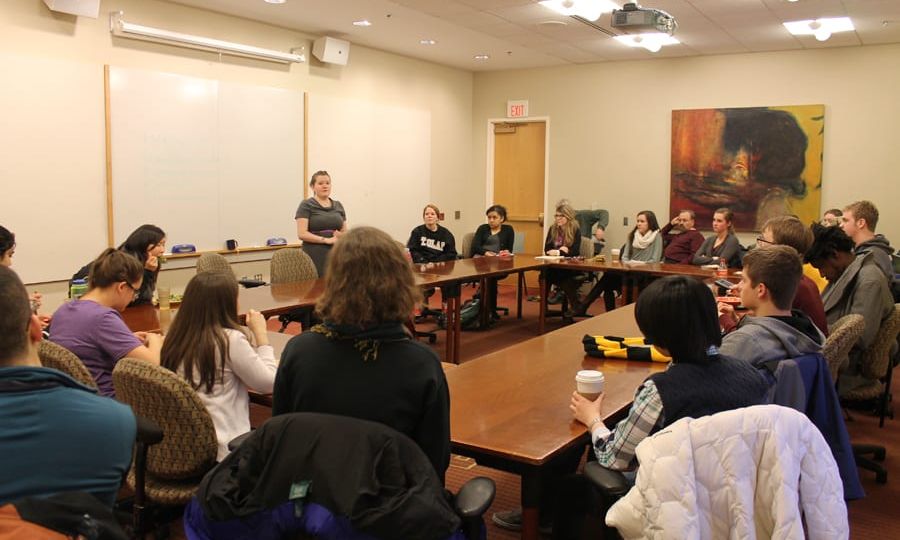
On Thursday, Feb. 13, St. Olaf welcomed Jamie Ebert to campus to talk about the strategy behind last year’s winning “Vote No” campaign to legalize same-sex marriage in Minnesota. The event was co-sponsored by the Political Awareness Committee PAC and GLOW Gay, Lesbian or Whatever, the LGBT awareness group on campus.
Ebert is the former Field Organizer for Minnesotans United for All Families, an organization working to ensure that all Minnesotans have an equal opportunity to marry whomever they choose. To the people coming into BC 143, she mentioned that both of her brothers attended St. Olaf and that she herself is a “huge St. Olaf fan.” She also called GLOW “the best gay activist group name I have ever heard.”
Before the talk began, Ebert wrote the following list on a whiteboard:
1. Tell a story
2. Connect with your audience
3. Contrast with your opposition
4. Compell [sic] to action
5. Know your messenger
This list turned out to be the majority of the thought process behindthe Vote No campaign. Ebert mainly discussed the use of television advertisements and their relative effectiveness in political campaigns. To be most effective, Ebert said, they should closely follow the points on her list.
Ebert also mentioned the importance of language, both in advertisements and phone calls to potential voters. For example, she explained that because “the average person doesn’t know what [the acronym LGBT] is,” she and other phone bank callers would instead use the term “gay people,” despite that not being completely representative of the group in question. In that case, knowing your audience is most important in creating a connection with them.
Next, Ebert showed the audience three different TV ads. The first two were about Proposition 8, the California constitutional amendment to eliminate same-sex marriage that passed in 2008. The third was about Minnesota’s Vote No campaign.
The first ad was modeled on Apple’s “I’m a Mac” ads and used, as Ebert explained, “hot-button words” like “discrimination” and “equality” to convey the flaws of the proposition. These words are what Ebert describes as “language from the head,” meaning that they are spur-of-the-moment reactions to injustice that necessarily come across as blunt. She said that this kind of language is not the most effective because it is not fully thought-out.
The second advertisement, one that only ran for the two weeks prior to voting day but that the average Californian saw upwards of 47 times, proved to be a devastating blow to California’s Vote No campaign. It showed a young girl learning about same-sex relationships in school and served as a warning to parents that their own children would be negatively affected by such teaching. Ebert said that this ad “hit people in the gut” and increased the margin by which Prop 8 won by hundreds of thousands of votes.
Observing the negativity of both of those ads, Minnesota’s Vote No campaigners hoped to use a more positive approach for their own advertisements. The one Ebert showed also had its audience in mind, but aimed to change their minds rather than reinforce what they already knew. The couple in the ad, a white, suburban, middle-class husband and wife, talked about their experience getting to know a lesbian couple that moved into their neighborhood. Keeping a very positive tone, the couple talked about how friendly the women were and what great neighbors they turned out to be, which ended up shifting the perspective they previously had about gay people.
Ebert said this ad campaign, which featured ads all along the same lines as the one she showed, played a huge role in the success of Vote No. These ads were relatable and personalized what has historically been a very divisive issue. They talked about “what marriage means and our values and what’s in our guts and our heart,” Ebert said.
This focus on “love and commitment and family” rather than the use of scare tactics ultimately proved beneficial to the Vote No campaign.
“The positive message beat out the negative message,” Ebert said. “Love beat out hate.”
hagen@stolaf.edu
Photo Credit: BEKAH ENGSTRAND/MANITOU MESSENGER

